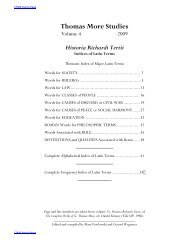life of john picus earl of mirandola - The Center for Thomas More ...
life of john picus earl of mirandola - The Center for Thomas More ...
life of john picus earl of mirandola - The Center for Thomas More ...
You also want an ePaper? Increase the reach of your titles
YUMPU automatically turns print PDFs into web optimized ePapers that Google loves.
5<br />
10<br />
15<br />
20<br />
Life <strong>of</strong> John Picus<br />
back into the voluptuous broad way1 ⌐ that leadeth to hell ¬ . What thing<br />
was there¦ <strong>of</strong> so marvellous strength that might overturn the mind <strong>of</strong><br />
him, which now (as Seneca saith) 2 was got above <strong>for</strong>tune?–as he which<br />
as well her favour as her malice hath set at naught, 3 that he4 might be<br />
coupled with a spiritual knot unto Christ and His heavenly citizens.¦<br />
⌐ How he eschewed Dignities. ¬ When he saw many men with great<br />
labour and money desire and busily purchase the <strong>of</strong>fices and dignities<br />
<strong>of</strong> the Church (which are nowadays, alas the while, commonly bought<br />
and sold) himself refused to receive them¦ when two kings5 <strong>of</strong>fered<br />
them. When another man6 <strong>of</strong>fered him great worldly promotion if he<br />
would go to the King’s Court,¦ he gave him such an answer that he<br />
should well know that he neither desired worship nor worldly riches, but<br />
rather set them at naught that he might the more quietly give himself<br />
to study and the service <strong>of</strong> God.¦ This ways° he [was] persuaded that<br />
to a philosopher and him that seeketh <strong>for</strong> wisdom it was no praise to<br />
gather riches¦ but to refuse them. 7<br />
⌐ Of the despising <strong>of</strong> Worldly Glory. ¬ All praise <strong>of</strong> people and all earthly<br />
glory he reputed utterly <strong>for</strong> nothing. But in the renaying° <strong>of</strong> this shadow<br />
<strong>of</strong> glory he laboured <strong>for</strong> very glory, which evermore followeth virtue as<br />
an inseparable servant. He said that fame <strong>of</strong>tentimes did hurtΔ8 to men<br />
14 This ways Thus / 18 renaying denying<br />
¦ 2 <strong>More</strong> omits inquam, “I say” (CW 1:322, 323). / 5 <strong>More</strong> here omits a transitional clause: Quod<br />
vel hoc argumento liquido percipitur: quod, “That this was so can be cl<strong>earl</strong>y seen from the following<br />
evidence…” (CW 1:322, 323). / 9 <strong>More</strong> omits per internuntios oblatas (testes adsunt gravissimi, testis<br />
ego) se sacris initiari nolle respondens, “through their intermediaries, replying that he did not wish to<br />
enter into holy orders (to this there are very reliable witnesses, and I myself witnessed it also)”<br />
(CW 1:322, 323). / 11 <strong>More</strong> omits conspicatus angulum non relinqui in quem se conderet ademptaque<br />
esse cuncta suffugia, “since Picus saw that there would be no nook or cranny left <strong>for</strong> him to hide<br />
in and that all means <strong>of</strong> escape would be taken from him” (CW 1:324, 325). / 14 Here <strong>More</strong><br />
omits half a page <strong>of</strong> the Latin original, in which Gianfrancesco relates how Picus, following the<br />
example <strong>of</strong> many holy men who were reluctant to accept appointment to church <strong>of</strong>fices, declined<br />
the <strong>of</strong>fice <strong>of</strong> cardinal. / 16 <strong>More</strong> omits non quaesisse honores, “or to seek honors” (CW 1:324, 325).<br />
1. voluptuous broad way: Translates the Latin in mollem illam & spatiosam multorum viam, “to that broad<br />
highway <strong>of</strong> self-indulgence trodden by the many” (CW 1:322, 323).<br />
2. Seneca, De breviate vitae 5.3.<br />
3. which…naught: <strong>More</strong> condenses the Latin—cum illam, sive secundis flatibus tumidam sive adversis<br />
reflatibus humilem, aliquando contempserit, “since he scorned her in any case, whether her sail was<br />
swollen with favorable winds or drooping in the counterblasts <strong>of</strong> adversity” (CW 1:322, 323).<br />
4. he: For the Latin eius mens, “his mind” (CW 1:322, 323).<br />
5. two kings: <strong>The</strong> identity <strong>of</strong> these kings is unknown.<br />
6. another man: This figure has not been identified.<br />
7. to refuse them: Here <strong>More</strong> moves a brief passage that follows in the Latin original (et umbratilem…<br />
comitatur) to just after the following sentence (beginning Humanam gloriam in the Latin; see CW<br />
1:324, 325).<br />
∆8. <strong>More</strong> significantly alters the Latin, which says not that fame “<strong>of</strong>tentimes did hurt” but that<br />
it “is <strong>of</strong> some use to the living” (famam vivis nonnihil; CW 1:325, 324 respectively).<br />
17<br />
[66]<br />
Ambition subdued<br />
Shadow <strong>of</strong> glory<br />
Fame











